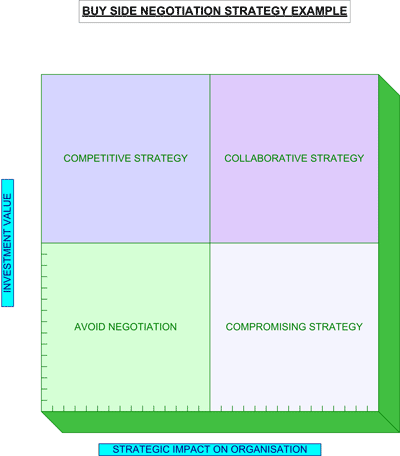| Collaborative Negotiation Strategy |  |
| Learn how to take a collaborative negotiation approach by understanding the needs and interests of all your commercial clients. |
Are you managing your commercial negotiations through conventional methods? Is it necessary to only take a win/win approach as a negotiation strategy?
Customarily, the results of any negotiation can be designated into one of the proceeding groups:
- Lose/Lose (all parties lose)
- Win/Lose (I win and you lose)
- Lose/Win (I lose and you win)
- Win/Win (we both win, but this could also be described as compromise)
- Win More/Win More (we maximize our shared resources by being collaborative)
Although I accept the concept that a win/win viewpoint is the only practical means to achieve a measure of competitive advantage in the marketplace, it is equally important that this approach is applied in a sensible manner in today's global marketplace. It would be near sighted to presume that all negotiated agreements are mutually equitable and ought to be tackled on a consistent basis. It would be like suggesting that a particular nation's culture & beliefs defines our meaning of culture and that only the standards of this specific culture should be used in connecting with people throughout the world, regardless of their respective backgrounds.
There is another aspect of commercial negotiations that is equally vital - the old economic quandary of 'guns or butter'. The 'guns or butter' story reveals that when resources are limited, organisations and individuals must make hard choices. If they want to have more butter, then they have to sacrifice some guns and vice versa. In reality, resources can only be shared as they relate to their strategic importance qt that specific moment. Any negotiations that are of strategic importance to the organisation will likely prompt us to take a collaborative or compromising approach. Likewise, when we believe that certain negotiations will have a limited impact or no impact at all on our strategic objectives, we might decide to become competitive in our approach or even to completely steer clear of the negotiation. We would not be managing our corporate resources responsibly if we were to take a similar approach to all our negotiations.
There is also an ideological component to negotiations that has been adopted by many organisations. Some organisations are well known for their collaborative style to doing business while there are those that have a reputation for being mercenary in their business approach. Some members of the retail sector are renowned for being ruthless with suppliers - they defend this approach by claiming that it is in the best interest of the consumer. Although I agree that this approach will not likely survive in the long term, it would be naive not to recognise the simple fact that a lot of business organisations have little interest in collaborative or compromising type negotiations within certain departments.
It is interesting to point out that while most organisations pride themselves on offering 'solutions' to the issues faced by their clients, many of their so called negotiations actually centre around haggling about price. I believe they sincerely intended to engage on a solution based principle, but it just seems that this is far easier said than done when the rubber hits the road. Often, a companies stated intentions to utilize a win/win based principle can be compared to the new year's resolutions so many of us make every year. There is little chance of us accomplishing our resolutions without putting in place a back up plan and taking action to attain our goals. Many organisations do not possess a clear organisational negotiation strategy & process which exposes them to the perils associated with a huge disparity in the results of their negotiated agreements.
Organisations and individuals should realize that collaborative negotiation requires the investment of significant resources. To be truly collaborative, we have to spend a lot of time getting to know each other. Partnering doesn't happen overnight - partnerships require significant investments of time and money, so choose your partners wisely. In a commercial context, this obviously does not make sense in some cases. Consider a pure commodity purchase such as paper for a small or medium sized organisation - if there are no value added services presented or required it would not make sense to pursue a collaborative relationship with the provider of such a commodity. It would be more reasonable to pursue a competitive approach to the procurement of paper than a collaborative or even compromising approach. In reality, many organisations would likely try to purchase the paper or stationery by asking for many quotations and give the business to the lowest bidder. In truth, there are some cases where no negotiation would take place at all. One point to note here is that this does not mean that the paper supplier has lost out because of this transaction - they have won the order, but it also reveals that we were not really interested in their interests at all; we were only focused on our own desired objectives. So, by taking a win/lose strategy in this example has not really resulted in a loss for the supplier, it does mean that we were not really interested in the objectives they hoped to achieve.
The opposite side of this example is that if you are selling commodity type products, you must understand that before you will be in a position to negotiate, you must create for yourself a base to do this from - hence the move towards presenting solutions.
How then do we determine which negotiation strategy to follow? Within a commercial perspective, the following negotiation strategy options are open to us:
- Steer clear of negotiation altogether.
- Aggressively achieve our goals through competitive negotiation.
- Satisfy the needs of our counterparty to the exclusion of our own needs by being accommodating in our negotiations.
- Compromising by realizing some of our needs and some of the needs of our counterparty.
- Satisfy all our needs and all the needs of our counterparty by taking a collaborative negotiation approach.
The negotiation strategy that is appropriate will be established by how you answer the following two questions:
- How strong are my alternatives to this specific negotiation?
- How vital is a long term relationship in the context of this negotiation?
 It follows that in many instances, buyers would either follow an approach where they avoid negotiation or become competitive, while sellers would like to be either compromising or collaborative. How should this situation be handled?
It follows that in many instances, buyers would either follow an approach where they avoid negotiation or become competitive, while sellers would like to be either compromising or collaborative. How should this situation be handled?
A vital component of the negotiation preparation process should be focused on trying to understand the needs, interests and objectives of your counterparties. This will help you to identify the likely negotiation strategy that your counterparties will adopt. If your counterparty is avoiding a negotiation, you can be certain that your organisation is not being seen as offering any competitive advantage to your counterparty's organisation. In the first instance, your challenge would be to reconsider the way that your products and services are packaged. The objective should be to add to the strategic business objectives of your counterparty by identifying those components that meets their strategic needs.
If you find yourself at the wrong end of a competitive negotiation, you should familiarize yourself with the negotiation tactics they might use against you, as you will most certainly be faced with a tactical approach. Unless you understand negotiation tactics, it will be difficult for you to gain the most value that you will be derive from the negotiation because your counterparty will have no sincere interest to satisfy any of your needs or interests.
Back to Negotiation Articles
We welcome the republication of this page's contents in part or full - we just ask that you include a clean link back to this site, to our www.negotiationtraining.com.au/training/ page.
|
Reader Comments
Average Reader Rating:
share your comment |
|
|
No comments |






Reader Comments
Average Rating:
Total Comments: 0